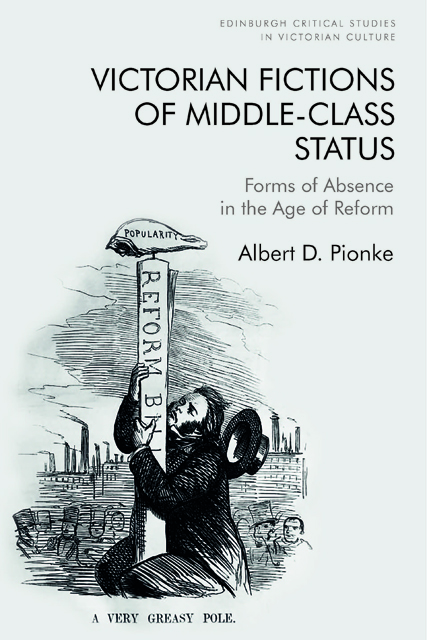Book contents
- Frontmatter
- Contents
- Acknowledgements
- Introduction: Victorian Middle-Class Status and the Negative Assertion of Value
- 1 The Orphan Narratives of a Class Lacking Antecedents
- 2 Repudiations of Wealth in Victorian Financial Fiction
- 3 The Violence at the Heart of the Social Problem Novel
- 4 Social Domination, Social Scientific Empiricism, and Novelistic Distrust of the Modern Fact
- 5 Legitimizing the Subjection of Middle-Class Women in Mid-Victorian Fiction
- Afterword
- Bibliography
- Index
1 - The Orphan Narratives of a Class Lacking Antecedents
Published online by Cambridge University Press: 25 April 2023
- Frontmatter
- Contents
- Acknowledgements
- Introduction: Victorian Middle-Class Status and the Negative Assertion of Value
- 1 The Orphan Narratives of a Class Lacking Antecedents
- 2 Repudiations of Wealth in Victorian Financial Fiction
- 3 The Violence at the Heart of the Social Problem Novel
- 4 Social Domination, Social Scientific Empiricism, and Novelistic Distrust of the Modern Fact
- 5 Legitimizing the Subjection of Middle-Class Women in Mid-Victorian Fiction
- Afterword
- Bibliography
- Index
Summary
Victorian fiction is disproportionately populated by orphans and bastards. According to demographic historians, there were an average of approximately 38,000 of the former in state care at any one time between 1844 and 1877, a period in which the total population grew from between sixteen to twenty-five million; whereas at no point in nineteenth-century history did the illegitimacy ratio, the percentage of registered baptisms recorded as unsolemnized by parental marriage, rise above seven percent. Although there is room for considerable debate about these numbers, no amount of methodological revisionism will account empirically for the proliferation or prominence of characters without parents or without legitimate parentage in the mid-nineteenth-century novel. Among the embarrassment of illegitimate riches is Emily Brontë’s Wuthering Heights (1847), which recounts the disruptive introduction of a presumably orphaned, illegitimate, and racially suspect foundling brought home from Liverpool, Heathcliff, on successive generations of families at adjacent country estates. In Bleak House (1853), Charles Dickens offers a veritable catalog of orphans, from Jo, the poor crossing sweeper; to Ada and Richard, the wards of John Jarndyce who are also competing plaintiffs in the novel’s Chancery case; to Esther, who, it turns out, is also illegitimate. Elizabeth Gaskell’s contemporary novel, Ruth (1853), features an eponymous orphan who gives birth to an illegitimate son and ultimately dies from a fever caught from the rakish father of her child. At the end of the decade, George Eliot similarly constructs the plot of Adam Bede (1859) around the seduction of a working-class orphan by a member of the squirarchy, although in this case the birth and death of their bastard child creates a different set of legal problems for the rural community of Hayslope.
In so centrally featuring fictional individuals with a tenuous relationship to their consanguineous pasts, Victorian novelists were both doubling down on and subtly remaking a characterological trend with a significant pedigree in English literary history. As critics often note, Shakespeare’s King Lear provides an early-modern prototype for the literary bastard as “sexy scoundrel” in Edmund, who consistently outshines his legitimate half-brother Edgar even as he schemes to inherit lands and titles to which he has no legal claim.
- Type
- Chapter
- Information
- Victorian Fictions of Middle-Class StatusForms of Absence in the Age of Reform, pp. 26 - 60Publisher: Edinburgh University PressPrint publication year: 2022

